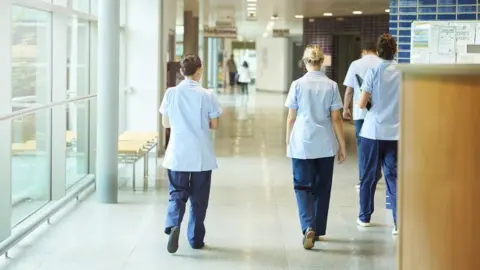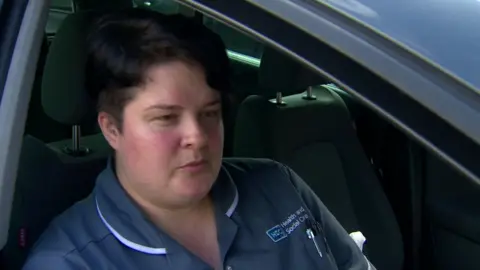Health Minister announces increased mileage rate for HSC staff
 Getty Images
Getty ImagesHealth Minister Robin Swann has announced an increase to the mileage rate for work-related car travel by Health Trust staff.
It will apply to the majority of Health and Social Care workers for mileage incurred above the first 3,500 miles.
The rate will rise from 20p per mile to 30ppm for an initial six month period, which will be reviewed.
The union Unison has said the increase will provide "some respite" for hard-pressed workers.
Meanwhile, the current rate for mileage incurred up to the first 3,500 miles is 56ppm.
The Department of Health said the increase will benefit those who are required to use their vehicles most frequently and payments will be backdated.
They will be implemented through staff payroll systems, which the department said will take "some time".
In the meantime, the department said, trusts are being asked to explore issuing eligible staff with fuel cards when they reach the 3,500-mile threshold.
 PA Media
PA MediaMr Swann said the decision was taken after "careful consideration of options prepared by officials in recent weeks," but that it was "at risk" because he did not have a finalised budget.
"Funding pressures in health may be significant by the second half of this financial year," he said.
Workers in serious difficulties
A Unison spokesperson welcomed the change to mileage rates for members "in response to their sustained pressures in the workplace".
They said the allowances "form part of the UK-wide terms and conditions" that are currently under review.
"Rising fuel costs punched a hole in the UK-wide AFC allowances and have left many workers in serious difficulties," the spokesperson said.
"Discussions are now under way to arrange the use of fuel cards and we are awaiting further information.
"There cannot be any delay in getting this support directly to staff who urgently need the means to keep their vehicles on the road while doing their job."


'It is stressing me out'
Diana Kveiniene drives about 200 miles a week as a domiciliary and community care worker. She said that since the spike in fuel prices, the travel allowance has not covered her costs - and the new rate is still not enough.
She told BBC Radio Ulster's Evening Extra programme that she may have to consider another job.
"It doesn't do any much better than it was before really," she said about the new rate.
"We are doing a lot of travelling and what is affecting us most is the diesel prices."
Ms Kveiniene said the announcement that trusts are being asked to explore issuing eligible staff with fuel cards when they reach the 3,500-mile threshold would be helpful.
"At the moment it is not even the diesel prices going up, at the same time there is the electric," she added.
"It is a high rate for everything.
"It would be better to have a fuel card to get the diesel.
"I have four children and I am trying to pay the bills as best as I can.
"At the moment, I can't do anything to make savings, it is stressing me out."

Rita Devlin, director of the Royal College of Nurses (RCN) in Northern Ireland, said the cost-of-living crisis was having a significant impact on nursing staff, with increasing fuel prices leaving some nurses "effectively paying to work".
"RCN Northern Ireland and the other health trade unions have been working closely with the Department of Health for some time to campaign for an increase in mileage rates.
"While this is a modest increase, it will be a relief to staff who have experienced considerable financial strain to provide care to patients."
'Sustained and funded' approach needed
Stormont ministers are acting as caretakers due to political disagreement which has blocked the formation of an executive.
They can continue to run their respective departments, but no new decisions, such as agreeing a budget, can be taken without an executive.
The Democratic Unionist Party (DUP) has said it will not go into an executive until there are significant changes to the Northern Ireland Protocol.
The party has also refused to support the election of a Speaker so the assembly can not sit.
"I am very mindful of the cost of living pressures on health and social care staff and across the wider community," Mr Swann said.
"While I am pleased to confirm this mileage rate increase, I would also stress that a sustained and funded cross-Departmental approach is the best way to address cost of living issues and provide our citizens with the support they need."
